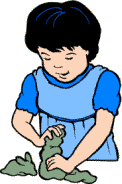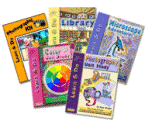Learning Styles
Why
are They So Important?
Scientific studies show that people take in or perceive
information differently and process information
differently. The way we view the world is how we
perceive information. Some learners need to "see" things
concretely (through our five senses) to understand
information. Other learners can understand information
abstractly (visually understand what cannot be seen).
Each child is created to be totally unique. There are no
two alike, in appearance, personality or preferences.
This uniqueness is often apparent in how children learn.
One child may learn best by reading many books while
another may have to try everything that they see in
books. A third child may learn best by listening to
tapes and lectures. Most children have a combination of
learning styles, but one style will be dominant.
Studies show that 70 percent of children do not
learn well the way the schools teach—
lecture/textbook/test — most students need more.
Even the Bible addresses our differences:
For as the body is one, and hath many members, and
all the members of that one body, being many, are one
body: so also [is] Christ. For by one Spirit are we all
baptized into one body.. For the body is not one member,
but many.
1 Cor 12
There are a few very
good reasons you should know your children’s learning
styles:
* Most parents assume their children learn exactly like
they do.
* Without knowing your children’s learning styles, you
may choose a curriculum that doesn’t reach your children
where they’re at.
* Determining learning styles aids parents in choosing
curriculum, teaching methods and extracurricular
activities.
* By understanding the different learning styles
yourself, you can then help your children understand
them too, which will help them relate to and communicate
better with the various people in their life.
We'll cover questions like these and more, to help you
determine your child's Learning Style, and probably
discover your own:
1. What kind of explanations help this child learn new
ideas, concepts, or skills?
2. How does the child read and spell?
3. How does the child write?
4. How does the child remember things?
5. How does this child solve problems?
6. How does this child respond to periods of inactivity?

















